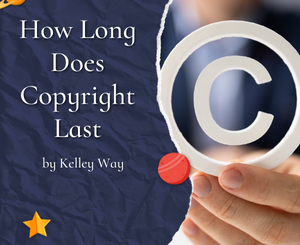Using Real People in Stories – Part 1
Welcome to the monthly column on literary law. Today we focus on the thorny issue of using real people in our stories — from our monthly guest columnist, Kelley Way, a lawyer specializing in literary law. If you have general questions for Kelley on contracts or other aspects of literary law, be sure to comment below. Thanks!
PS. A list of books on literary law can be found here.
PPS. For more on copyright, visit the U.S. Copyright Office.
And now for a bit of necessary legalese: Please note that this article does not constitute legal advice, and that an attorney-client relationship is not formed by reading the article or by commenting thereon.
***
One of the more frequent questions I am asked is whether an author can use a person’s name, life story, or attributes in his or her novel. It’s a thorny issue, which is not surprising when a person’s reputation, privacy, and/or identity is involved.
To make matters worse, there are few, if any, federal laws on this subject, so what claims an angry plaintiff can pursue, and the nature of those claims, will vary from state to state.
Here, I’ll cover the most common claims, and how they’re defined under California law.
If you live outside of California, and are concerned about using a real person in your novel, you’ll need to consult with a local attorney to learn how your laws differ.
The claims fall under three categories – defamation, violation of the right of privacy, and violation of the right of publicity. I’ll be covering each of these claims in a separate article. Today I’ll cover defamation.
Defamation
This one is fairly well known, and can probably be avoided without too much difficulty. The essence of defamation is that you told a lie which hurt a person’s reputation.
For the sake of expedience, we’ll call this person John.
There are two subcategories to defamation, slander (the spoken form) and libel (the written from). Since our concern is using John in your novel, we’ll stick to libel. The official elements of libel are:
1.) You asserted (i.e. presented as true) a fact that reflects negatively on the person’s character
2.) You “published” this fact (put it in your novel, wrote it on your blog, etc.)
For example, let’s say you’re writing a memoir. You feel that it needs to be more interesting, so you make up a story about your neighbor John and the meth lab he kept at the back of his house. This would be a defamatory statement – you asserted that John makes meth, which makes him a criminal and therefore a bad guy, and you put it in print for the world to see. John would not be pleased if he picked up your book and saw this.
The best way to avoid a defamation claim is, of course, to not lie about a person, and only say or write positive things that he or she wouldn’t object to. If you must say or write something negative, make sure that it’s true: truth is an absolute defense in any defamation case. If John really did have a meth lab at the back of his house, there’s not much he can do – though he might still try, if he’s mad enough.
Another absolute defense is if you can show that John consented to you making the defamatory statement. I honestly don’t know when or why a person might agree to this, but it’s a valid defense nonetheless. If John does agree, make sure you have it in writing.
And, last but not least, defamation only applies to living people; only the person whose reputation was injured can bring a defamation claim. If John died five years ago, there is no one who is hurt, and thus no valid claim to bring.
A side note: John would have a harder time with his lawsuit if the matter you talked or wrote about was a matter of public concern – for example, if he was a senator, and you wrote the story about his meth lab. Lawmakers don’t want people to be afraid to speak out on real issues, for fear of being sued for defamation, so they make it harder for plaintiffs to win in cases like this one. In a case like this, John would have to prove two additional elements, beyond the two above. First, he would have to prove that the statement was false (as opposed to before, where you, the defendant, could prove that it’s true and use the truth as your “get out of jail free” card). Second, he would have to prove that you knew it was false, or at least that you should have known and would have if you’d done a halfway decent job of researching it. In other words, John has to prove that you made the statement in bad faith.
Hopefully this has given you a better understanding of how defamation works. If not, the comment section and my inbox are open. Feedback is always welcome!
Next time: I’ll cover violation of the right of privacy.
***
ABOUT THE AUTHOR
 Kelley Way was born and raised in Walnut Creek, California. She graduated from UC Davis with a B.A. in English, followed by a Juris Doctorate. Kelley is a member of the California Bar, and an aspiring writer of young adult fantasy novels. She can be contacted at KelleyAWay@gmail.com.
Kelley Way was born and raised in Walnut Creek, California. She graduated from UC Davis with a B.A. in English, followed by a Juris Doctorate. Kelley is a member of the California Bar, and an aspiring writer of young adult fantasy novels. She can be contacted at KelleyAWay@gmail.com.








[…] READ FULL POST HERE […]
[…] In my last article, we talked about defamation and how to avoid a defamation suit. While it’s important to know, it’s not likely to come up unless you actually lied and used the person’s name. In most cases, the average citizen will sue on the basis of violation of the right of privacy. […]